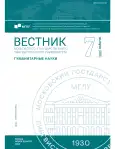Semantics of Emotion Nominees of the Concept Zorn / Gnev in German and Russian: a Comparative Study
- Authors: Vashunina I.V.1
-
Affiliations:
- Moscow State Linguistic University
- Issue: No 7(888) (2024)
- Pages: 16-21
- Section: Linguistics
- URL: https://journal-vniispk.ru/2542-2197/article/view/299403
- ID: 299403
Cite item
Abstract
The article is devoted to the semantics of the lexical units forming the core of the concept of ZORN/GNEV. The definitions of the words Zorn, Wut, Anger, Anger in lexicographic and encyclopedic sources are analyzed and the components of the semantics of these lexical units are highlighted. The structure of the meaning of the nominees of emotions in Russian and German were compared, on the basis of which the peculiarities of the mutual translatability of the nominees of emotions Zorn, Wut, Gnev, Zlost’ in the German-Russian pair of languages were revealed.
About the authors
Irina Vladimirovna Vashunina
Moscow State Linguistic University
Author for correspondence.
Email: vashunina@yandex.ru
Doctor of Philology (Dr. habil.), Associate Professor, Professor at the Department of Grammar and History of German, Faculty of the German Language
Russian FederationReferences
- Shahovskij, V. I. (2008). Lingvisticheskaja teorija jemocij = Linguistic theory of emotions. Moscow: Gnozis. (In Russ.)
- Krylov, Ju. V. (2006). The status of words "zlost" / "gnev" in the semantic field of emotions. Siberian Philological Journal, 4, 96–99. (In Russ.)
- Krasavskij, N. A. (2001). Jemocional'nye koncepty v nemeckoj i russkoj lingvokul'turah = Emotional concepts in German and Russian linguocultures. Volgograd: Peremena. (In Russ.)
Supplementary files










